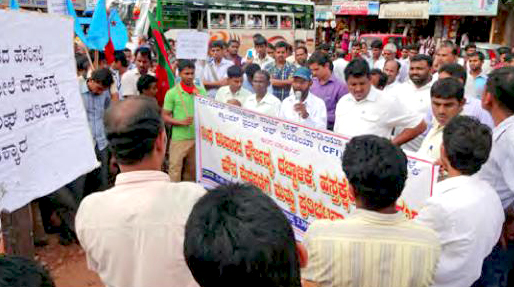
Sullia, September 12: Social Democratic Party of India (SDPI) and Campus Front of India (CFI) jointly organised a silent march in Sullia on Tuesday, protesting against the atrocities committed on minorities by the Sangh Parivar.
The campaigners took out a silent march from Shastri Circle and converged near the private bus stand, where speakers addressed the protesters.
SDPI Dakshina Kannada district General Secretary Akbar Ali accused the government of supporting the offences made by the ABVP activists by withdrawing the cases against them.
SDPI chief of Sullia taluk Shafi Bellary said that the Sangh Parivar and BJP which was full of corruption and irregularities, was now spreading its net to colleges and campuses through its youth-wing ABVP and with the help of the police.
Dalit Sangharsha Samiti district convener Koosappa said that the Dalit MLA of Sullia S Angara had been suffering humiliation from the hands of BJP from the past 20 years, and yet had set out to bring ruin to the Dalits on their orders. He questioned the silence of Sangh Parivar's leaders on the issue.
CFI State President Thufail raised questions on the ABVP as to why there had been no protests when ministers had been red-handed watching pornographic film in the assembly. He said that the SDPI had the power to put an end to their 'goondaism' in educational institutions.





Comments
Add new comment